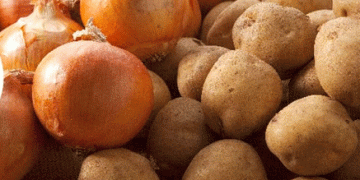Potatoes and onions are staple crops in Turkey, with growing importance in domestic and export markets. According to the Turkish Statistical Institute’s 2023 data, potato production increased by 9.6% to 5.7 million tons, and onion production rose by 10.6% to 2.6 million tons compared to 2022. Despite these gains, producers face shrinking margins due to market saturation and cost pressures.
Potato Production Growth and Concerns
Potato production saw an expansion in cultivation areas, growing by 8.4% in 2023. The leading provinces in production include Niğde, Nevşehir, and Kayseri, contributing over 70% of the country’s yield. Forecasts for 2024 predict a further 14% increase, with production potentially reaching 6.5 million tons.
However, the rapid growth brings economic challenges:
- Domestic potato consumption in 2023 was 4.9 million tons, slightly below production levels.
- Overproduction risks have driven farmgate prices down by over 50%, from an average of ₺9.50 per kg in 2022 to ₺4.70 per kg in 2023, threatening farmers’ financial viability.
Onion Production and Regional Trends
Onion cultivation spans 67 provinces, with Ankara, Amasya, and Çorum leading production. In 2023, onion output reached 2.6 million tons, and 2024 projections indicate a 7.7% rise to 2.8 million tons. While increased yields signal progress, price fluctuations have impacted profitability.
Challenges Facing Producers
Key difficulties include:
- High Input Costs: Fertilizer, seeds, and labor costs are rising, eroding profit margins.
- Price Instability: Overproduction has led to price suppression, affecting farmer income.
- Market Saturation: Domestic demand trails supply, leading to concerns about storage and waste.
Proposed Solutions
- Production Planning: Strategic planning to align supply with demand is critical. Including potatoes and onions in 2025 agricultural support programs is a step in the right direction.
- Price Stabilization Mechanisms: Organizations like the Turkish Grain Board (TMO) should intervene to stabilize market prices and prevent losses.
- Export Promotion: Expanding export markets could help absorb excess supply and stabilize domestic prices.
- Direct State Support: Subsidies, debt restructuring, and incentives for storage facilities can provide immediate relief to farmers.
Success Stories and Potential
Despite challenges, the high-quality produce and robust agricultural base in Turkey present opportunities for growth. Niğde and Nevşehir farmers, who have traditionally led production, can capitalize on improved practices and export-oriented policies.
Potato and onion production in Turkey showcases the resilience and potential of the agriculture sector. Addressing current challenges through production planning, market interventions, and sustainable practices can help ensure farmer profitability and sector growth. Policymakers and stakeholders must collaborate to turn these staple crops into economic assets for Turkish farmers.































